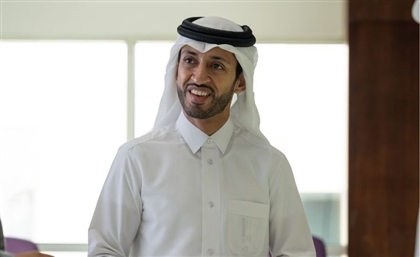Maison Pyramide’s Maria Sanchez Explains Why Building Your Startup Team Begins with Yourself
In 15 months since its inception, Maison Pyramide catapulted Middle Eastern nascent brands to global centerstage, powered by a team of 22 talents working at lightning speed. Co-founder Maria Sanchez unveils 4 managerial tools to find the right team, in her own words.

Building a company is no easy task. When you start setting the basis of your business and growing your very first team, you are basically asking others not only to believe in your idea, your project, or dream, but also to work hard to achieve this dream. Moreover, you are requesting a team of people who barely knows you to trust you blindly and to adapt willingly to the drastic changes of direction that will, most likely, appear on the way of your project.
You might be able to avoid the challenges I am about to mention if you are lucky enough to find the ideal “dream team” that everyone dreams of from the first moment - but so far, I haven’t heard of anyone who managed to. You will most likely have to deal with the many conflicts that will appear as a result of dealing with and grouping people from very different backgrounds - and who might not share the same philosophy of work.
Great managers are experts at activating the talent that surrounds them. They know how to press the right buttons.
In my journey as an entrepreneur, I have discovered that the companies that are ultimately able to sustain a solid team culture, and grow it in order to achieve their professional goals, are those who are not only well organised since the very beginning but, more importantly, those who are not afraid to pivot, those who make the difficult decisions and establish high standards of performance that are constantly being met – and improved at all times. Every. Single. Day.
This does not mean letting others do the job while you just sit there, applauding and watching them grow and learn, having the benefit of your company as the final goal. On the contrary, it means that in order for a manager to be able to request a certain standard of performance from employees he or she needs to start with themselves by acquiring the habit of positive self-criticism and hard work - and this comes with a lot of practice. I have seen many leaders who, after reaching a certain level or position at work, refuse to listen to advice. But what I have also seen is that the minute people think they no longer need direction or feedback because they do their job perfectly is the minute they slip and fall behind. Being self-aware, knowing exactly where you need to improve, and questioning your processes is crucial to continue developing in your career and growing your team. And it is the essence of effective team building.
Again, to build a successful team we need to start with ourselves - spotting our weaknesses and making enough time to develop skills such as time management, prioritisation, strategic thinking, decision-making, and keeping up with tasks. Then, we can pass this knowledge onto the rest of the team and request the same from them. But just as a fashion designer needs to know the basics of pattern making and sewing inside-out to be able to create a successful collection, a manager needs to understand and be aware of the characteristics that will make a balanced employee and a team with potential for growth - because he has experienced this himself.
Positive reinforcement is key. The biggest challenge of inspiring or motivating others is to ensure they are constantly satisfied with their jobs.
We cannot deny there is an obvious “brain drain” in Egypt; thousands of well-prepared professionals have migrated in search of a better standard of living and quality of life, higher salaries, and more stable social and political conditions. This leaves managers with a not-so-big pool of options - and with the need to invest a great deal of time and efforts actively searching for the “right people”. However, you would be surprised by the amount of talents you can find and grow as part of your company provided you are patient and have the right tools. But what are these tools? As a manager, there's key issues to consider:
1. Leading Your Team: First and foremost, you must make the time to get to know your team. It might sound obvious, but the truth is sometimes managers do not see the importance of caring and understanding the needs of the team. But that's not all there is to it; managers need to make time to get to know the real assets of each team member, which will eventually define the strength of the team as a whole. Assuming the strengths and weaknesses of a team member is simply a temporary patch that will save managers some time at the beginning but will give a lot of headache in the long run. Fully knowing your team means that you have invested the time to understand how they think and what is required to motivate them to excel beyond what is expected from them.

Together with co-founder Giovannina Atieh, Sánchez has managed to take global brands to the global stage, garnering the attention of international giants who want to market their brands in the Middle East.
Great managers are like magicians! They are experts at activating the talent that surrounds them. They know how to press the right buttons. They are the perfect at matching people’s strengths with fields of expertise.
2. Inspiring Your Team: Positive reinforcement is key. The biggest challenge of inspiring or motivating others is to ensure they are constantly satisfied with their jobs. They might not have the best working conditions or the best salaries - especially when working for a startup - but satisfied employees love what they do, and they want to continue to do it. Inspiring others is motivating them to work smarter from a position of of strength and respectability. Communication and feedback are the key to improve each day, to stay on track. A manager can and should inspire a team by giving proactive and constant feedback.
3. Developing Your Team: Growth comes with professional and personal development. Managers always need to have in mind - and look for - tools that will help their employees master or develop certain skills that will be for the benefit of the company. Courses, softwares, mentoring and coaching are some of the general tools that a company needs to continuously make use of along the way. Encouraging employees to look for tools that can help them grow is always a good idea.
There will always be egos in place, different personal interests and points of view, which might lead to conflict and escalate to a point you would have never thought it would.
4. Defining Roles and Managing Internal Politics: It is not easy to deal with internal politics. There will always be egos in place, different personal interests and very different points of view, which might lead to conflict and can escalate to a point you would have never thought it would, damaging the general functioning of the company. However, by knowing your team members well and their jobs, tasks and responsibilities, you will find conflict resolution is not impossible.
Each of the team member's job description and responsibilities must be clear to everyone, interconnected with the rest, and dependent on one another. Managers need not only to find employees who are brilliant at their job, but more importantly, they need to have a good eye to see whether these employees will fit the workplace culture and if they will be team players.
Photography by @MO4Network.
Phootgrapher: Lobna Derbala.
- Previous Article Bassita: Click Funding for a Better Egypt
- Next Article How to Validate Your Idea, According to Middle Eastern Investors






















